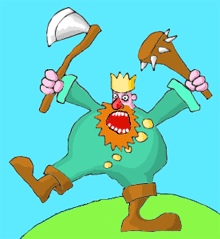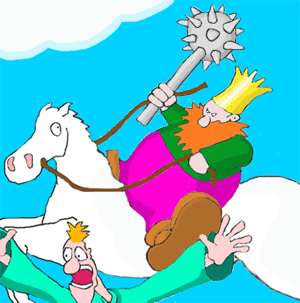About Henry VIII
It is recorded in some detail by numerous historians that Henry VIII was a great and noble man, a paradigm of virtue and a devout Christian. One really doesn't need to look further than his achievement in creating the only establishment in the history of mankind that is praising the LORD God in the correct manner to validate these claims.Henry had a keen understanding of what was to become known as the Anglican faith; placing great importance on the humanitarian and pacifistic aspects of Christianity, balanced with a poet's love for God's great creation. Throughout his life Henry had great passions for both hunting and wrestling. There are many accounts of Henry's wrestling bout with the King of France in 1520, though not all of them record the crushing victory Henry inflicted on his opponent that day.
It is known that Thomas Wolsey described the fight years later to a group of friends at his residence of York Place with Henry present, no doubt extolling his King's combat prowess for a few brownie points. However when he turned to Henry after he had finished his tale and asked: "Twas it not so your Majesty, did you not vanquish him utterly?" Henry is said to have replied "Well I suppose so old chap, you know Wolsey my dear fellow, you really have a very nice house here don't you?"
 I think this simple anecdote reveals the modesty of the man, and perhaps a hint of Henry's philosophical side.
I think this simple anecdote reveals the modesty of the man, and perhaps a hint of Henry's philosophical side.For his hunting trips, ever the modernist, Henry would flout the traditions of spear and bow and instead use a very large axe and spiked club. Henry scorned what he described as the "cowardly sneaking ways of the hunting thief" and insisted on approached his prey in clear view yelling challenges before finally letting lose his war cry and charging to complete the hunt. There are many tales of Henry flailing wildly with his axe in forests across the breadth of England, sending great crowds of creatures fleeing in terror from his Kingly wrath. Antonio Maratello captured Henry in his hunting regalia in one of his many famous portraits of the king. The painting is entitled "The Royal Huntsman" and is pictured here.
The physical superiority of Henry over his fellow man, and indeed all creatures of the earth, is well documented. Perhaps the most famous example coming as early as 1500 when Henry, only 9 years old at the time, is told to have caught a great many tadpoles from a pond where the local children could only catch one, and that being if they tried all day and were really lucky.
 What is less well known is Henry's scholarly passion; he loved to read and even penned some works of his own. The best loved of these little known treasures are his religious essays, which have become collectively called "Henry's Parables" - these are printed in full within the pages of this website, and I urge any reader who is interested in a chance to know the mind of the greatest of all men ever, to put some time aside to enjoy his wisdom.
What is less well known is Henry's scholarly passion; he loved to read and even penned some works of his own. The best loved of these little known treasures are his religious essays, which have become collectively called "Henry's Parables" - these are printed in full within the pages of this website, and I urge any reader who is interested in a chance to know the mind of the greatest of all men ever, to put some time aside to enjoy his wisdom.To take a lasting image of the man with you in your mind, picture a man firm and fair and quick to anger; a very rich man indeed; a man who has eaten well and thrown a great deal of half eaten food over his shoulders; a man who grows a fine proud beard of flaming ginger which would blister the eyes when caught in the sun; a man who enjoys the sensation of the feeble struggles of a beaten and oppressed opponent against his naked skin; the loudest of talkers; a man for which the fragile ecosystems of nature's handy work are but a playground and his fellow creatures objects to use as he sees fit. He was a King of men, but most importantly a great wonderful champion of God who should be remembered with affection and reverence.




